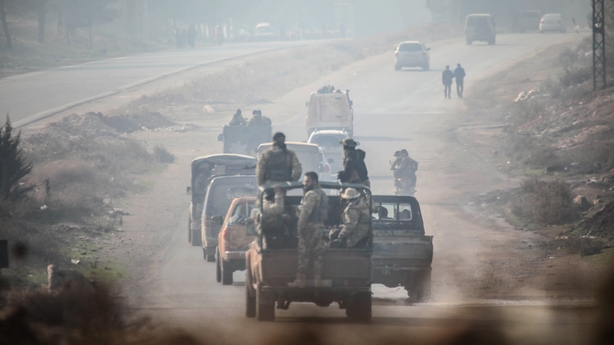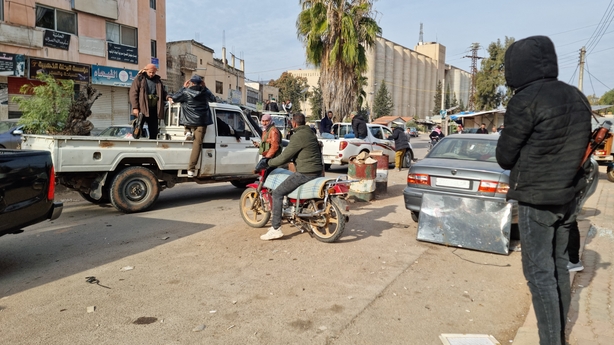Insurgent forces have "fully liberated" the Syrian city of Homs, rebel commander Hassan Abdul Ghany said, throwing President Bashar al-Assad's 24-year rule into the balance.
Since the rebels' sweep into Aleppo a week ago, government defences have crumbled at dizzying speed as insurgents seized a string of major cities and rose up in places where the rebellion had long seemed over.
The twin threats to strategically vital Homs and the capital Damascus now pose an existential danger to the Assad dynasty's five-decade reign over Syria and the continued influence there of its main regional backer Iran.
A Homs resident, and army and rebel sources said the insurgents had earlier breached government defences from the north and east of the city.
A rebel commander said they had taken control of an army camp and villages outside the city.
We need your consent to load this rte-player contentWe use rte-player to manage extra content that can set cookies on your device and collect data about your activity. Please review their details and accept them to load the content.Manage Preferences
Insurgents seized almost the entire southwest within 24 hours, and they advanced to within 30km of Damascus as government forces fell back, rebels said.
Underscoring the possibility of an uprising in the capital, protesters took to the streets in several Damascus suburbs, ripping up Assad posters and tearing down a statue of his father, former President Hafez al-Assad, uncontested by army or police.

Some were joined by soldiers who had changed into civilian clothes and deserted, residents said.
However, the state news agency reported that Mr Assad remains in Damascus, and the military said it was reinforcing around the capital and south.
The pace of events has stunned Arab capitals and raised fears of a new wave of regional instability.
Syria's civil war, which erupted in 2011 as an uprising against Mr Assad's rule, dragged in big outside powers, created space for jihadist militants to plot attacks around the world and sent millions of refugees into neighbouring states.
Mr Assad had long relied on allies to subdue the rebels. Russian warplanes conducted bombing while Iran sent allied forces including Lebanon's Hezbollah and Iraqi militia to reinforce the Syrian military and storm insurgent strongholds.
But Russia has been focused on the war in Ukraine since 2022 and Hezbollah has suffered big losses in its own gruelling war with Israel, significantly limiting its ability or that of Iran to bolster Syria.
US president-elect Donald Trump said the US should not be involved in the conflict and should "let it play out".
Foreign leaders discuss next steps
The foreign ministers of Russia, Iran and the rebels' main backer Turkey met and agreed on the importance of Syria's territorial integrity and on restarting a political process, they said.
But there was no indication they agreed on any concrete steps, with the situation inside Syria changing by the hour.

Russia has a naval base and airbase in Syria that have not only been important for its support of Assad, but also for its ability to project influence in the Mediterranean and Africa.
Moscow has been supporting government forces with intense air strikes but it was not clear if it could easily step up this campaign.
Iran has said it would consider sending forces to Syria, but any immediate extra assistance would likely depend on Hezbollah and Iraqi militias.
The Lebanese group sent some "supervising forces" to Homs yesterday but any significant deployment would risk exposure to Israeli airstrikes, Western officials said.
Iran-backed Iraqi militias are on high alert, with thousands of heavily armed fighters ready to deploy to Syria, many of them amassed near the border. Iraq does not seek military intervention in Syria, a government spokesman said.
Britain warned Mr Assad that any chemical weapons use was a red line and would be met with "appropriate action".

A rebel operations room led by the main rebel group, the Islamist Hayat Tahrir al-Sham, a former al Qaeda affiliate, said in a statement that it has no intention of using chemical weapons now controlled by Syrian authorities "under any circumstances".
Battle for Homs
The Homs resident said he had seen the rebels advance past a Syrian Air Force base in the north of the city that was considered a major defensive area. The resident later said fighting was audible in the city outskirts.
An opposition figure in touch with rebel command and a Syrian army source both also said the insurgents were inside the city.
Seizing Homs, an important crossroads between the capital and the Mediterranean, would cut off Damascus from the coastal stronghold of Mr Assad's minority Alawite sect, and from Russia's air and naval base.
In a sign of government forces' collapse in the east, around 2,000 Syrian soldiers crossed the border into Iraq to seek sanctuary, the mayor of Iraqi border town al-Qaem said.
Syrian Kurdish fighters captured eastern Deir el-Zor yesterday, jeopardising Mr Assad's land connection to allies in Iraq.
Read more: Latest Middle East stories

